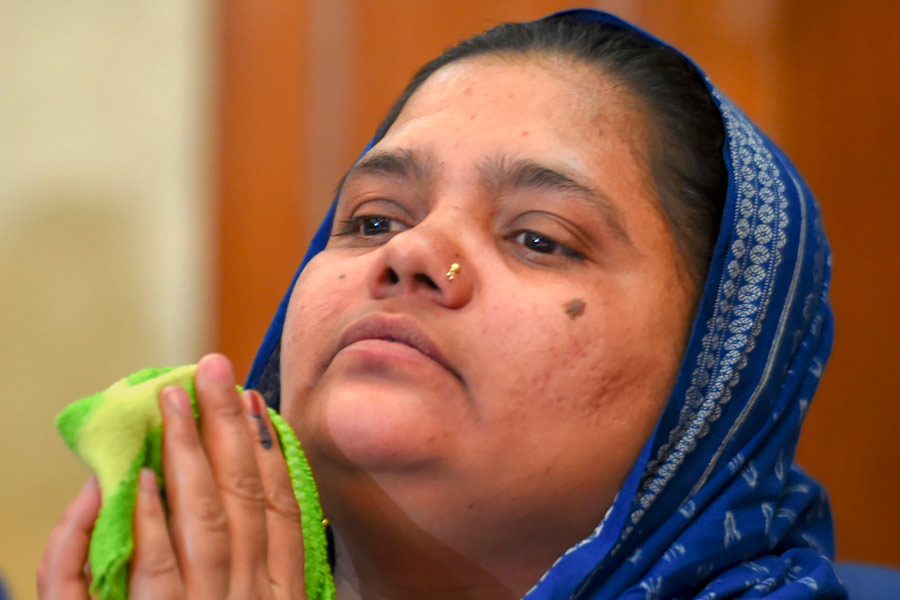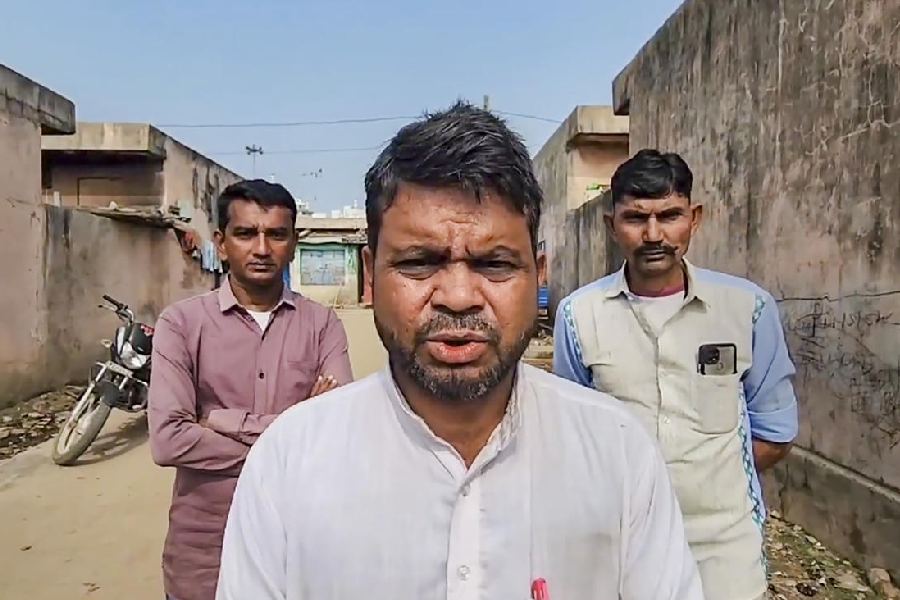Top judicial, CBI and police officials in Gujarat and Maharashtra had strongly opposed the premature release of the 11 life convicts in the Bilkis Bano gang-rape-and-murder case but the state government chose to free them, records before the Supreme Court revealed.
The bench of Justices B.V. Nagarathna and Ujjal Bhuyan, which on Monday struck down the relief granted to the 11 convicts by the Gujarat government in August 2022, noted several instances where the official machinery strongly opposed their release but the state government chose to free them.
Citing earlier judgments of the apex court, Justice Nagarathna said the rule of law could not be compromised on the grounds of political expediency as “to go by such consideration would be subversive of the fundamental principles of rule of law and it would amount to setting a dangerous precedent”.
Giving a blow-by-blow account, the bench noted that one of the convicts — Radheshyam Bhagwandas Shah — after undergoing 14 years 5 months and 6 days of his sentence, moved Gujarat High Court in 2019, challenging the non-consideration of his premature release plea under CrPC sections 433 and 433A.
The high court on July 17, 2019, turned down the plea on the ground that according to Section 432 (7), the “appropriate government” for Sections 432 and 433 of the CrPC would be the state of Maharashtra.
Shah then moved an application dated August 1, 2019, before the secretary in the department of home affairs in Maharashtra, seeking premature release citing the Gujarat High Court order.
However, on August 14, 2019, the CBI submitted its report to the Maharashtra government wherein it recommended that Shah should serve his sentence fully and no leniency should be given to him. The CBI submitted that the convict had actively participated in the heinous crime and that the offences committed by him and others were serious in nature, and thus he should not be pardoned nor the sentence suspended or remitted.
On January 3, 2020, the CBI special court in Mumbai also gave a negative report and objected to Shah’s premature release based on the seriousness of the offence.
On February 3, 2020, the superintendent of police of Dahod, Gujarat, in his report submitted to the collector and district magistrate of Dahod, objected to the premature release of Shah on the ground that Bilkis and her family feared for their safety if he was released.
The office of the collector and district magistrate of Dahod on February 19, 2020, also expressed a similar view.
The convict again approached the Gujarat High Court, which on March 13, 2020, again observed that the appropriate government to exercise the power of remission would be Maharashtra and not Gujarat.
On July 7, 2021, a meeting of the jail advisory committee (JAC) of Gujarat took place. The participants included four social workers, two members of the State Legislative Assembly; the Godhra SP, the district and sessions judge of Godhra, the secretary of the jail advisory committee, the superintendent of Godhra sub-jail and the district magistrate of Godhra (chairman of the jail advisory committee of Godhra sub-jail).
The sessions judge of Godhra, being one of the 10 members of the JAC, observed that Shah had been sentenced to life imprisonment in a sensitive case and his premature release might create an adverse effect on the society as there was a possibility of peace being disturbed.
However, the other committee members recommended the grant of remission to Shah because he had completed 15 years of imprisonment and his conduct in prison had been good.
On August 18, 2021, the additional director-general of police, prisons and correctional administration of Gujarat, vide his letter to the additional chief secretary in the state’s home department, did not recommend the premature release of Shah after considering the JAC’s opinion.
In the interregnum, the rest of the convicts applied for remission in February 2021 to the superintendent of the Godhra sub-jail.
When the CBI’s opinion was sought on this, the special judge (CBI), Greater Mumbai, objected to the remission plea. By a common opinion dated March 22, 2021, the CBI special judge stated that since all the accused were tried and convicted in Mumbai, the government resolution issued by the home department of the government of Maharashtra would apply to them.
The special judge, after perusing the guidelines issued by the government of Maharashtra on November 16, 1978, May 11, 1992, and the government resolution dated April 11, 2008, observed that the resolution dated April 11, 2008, would apply as it had superseded all earlier orders and guidelines and would have been applicable in the normal course to the convicts undergoing life imprisonment.
The special judge further noted that the case of the convicts mentioned above would fall under categories 2(c), 2(d) and 4(d) of the policy dated April 11, 2008, according to which the minimum period of imprisonment to be undergone is 28 years (Category 2(d)).
In other words, the convicts could be released only somewhere in the year 2035 when they would have completed 28 years of imprisonment.
However, subsequently, the Dahod SP recommended the premature release of the 11 convicts. His opinion was seconded by the collector and the district magistrate of Dahod.
The apex court noted in the judgment that: “In the aforesaid backdrop, when various steps were in progress at various stages, stealthily a writ petition… was filed before this court by respondent No.3 (Shah) seeking a direction to the Gujarat government to consider his application for pre-mature release under its policy dated 09.07.1992, which was existing at the time of commission of his crime and his conviction.”
The earlier two-judge bench of Justices Ajay Rastogi (since retired) and Vikram Nath on May 13, 2022, directed the Gujarat government to consider the premature release of the convict on the basis of an earlier policy of remission dated July 9, 1992.
Pursuant to the earlier judgment of the apex court, the Gujarat jail advisory committee on May 26, 2022, recommended the grant of remission to respondent Nos. 3 to 13.
The sessions judge of Godhra also endorsed the jail advisory committee’s recommendation.
Thereafter, on June 28, 2022, the Gujarat home department addressed a letter to the secretary in the ministry of home affairs (MHA), seeking sanction for the premature release of the convicts since the case was investigated by the CBI, which is under the central government.
The MHA on July 11, 2022 granted its approval, following which the Gujarat government directed their release in August 2022.
“In our view, on a plain reading of sub-section (7) of Section 432 of the CrPC and considering the judgments of this Court, it is the State of Maharashtra, which had the jurisdiction to consider the application for remission vis-à-vis respondent Nos.3 to 13 herein as they were sentenced by the Special Court, Mumbai.
“Hence the applications filed by respondent Nos. 4 to 13 seeking remission had to be simply rejected by the State of Gujarat owing to lack of jurisdiction to consider them. This is because Government of Gujarat is not the appropriate Government within the meaning of the aforesaid provision. The High Court of Gujarat was therefore right in its order dated 17.07.2019,” the apex court said while quashing the Gujarat government order.












